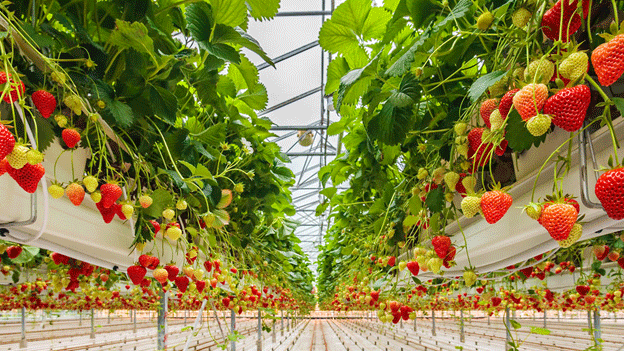The United Kingdom faces significant challenges in extending its growing seasons due to its climate and latitude. Currently, much of the UK’s fruit and vegetable supply depends on European imports and energy-intensive artificially lit greenhouses. However, researchers at the Universities of Bath and Cambridge, in partnership with Lambda Agri, have developed a groundbreaking spray coating for greenhouse glass that optimizes light for plant growth, offering a sustainable solution to this issue.
How the Spray Works
The spray transforms the way light interacts with greenhouse plants. By converting blue and ultraviolet (UV) light into red light—most efficient for photosynthesis—the technology maximizes plants’ ability to produce sugars, thereby improving growth and yield. The coating also scatters light, ensuring more even illumination inside the greenhouse, which further enhances productivity.
Field trials have shown a 9% increase in crop yield for basil grown in treated greenhouses. Additionally, this innovative spray increases the sugar content in fruits, potentially improving their taste.
A Sustainable and Scalable Solution
Unlike similar technologies in the United States that rely on rare earth metals like indium, this UK-developed spray uses a cost-effective, abundant material. It is manufactured using a chemical flow reactor, enabling quicker and more scalable production. This innovation aligns with global efforts to reduce energy usage and carbon emissions in agriculture, making it a highly sustainable option.
Government Support and Future Potential
The project has received significant backing from the UK government, including a £500,000 DEFRA grant and a £750,000 investment from the Net Zero Innovation Portfolio. This support underscores the importance of innovations that improve food security while addressing climate change.
The researchers envision that this spray could extend growing seasons in northern climates, reducing reliance on imports and artificial lighting. This would lower production costs, decrease environmental impacts, and make fresh produce more accessible to consumers.
Voices from the Experts
Professor Petra Cameron from the University of Bath highlights the practical implications: “Our technology could be used to extend growing seasons and reduce artificial lighting needs, saving money and reducing carbon emissions. Additionally, it improves fruit taste by increasing sugar content.”
Professor Dominic Wright of Cambridge University adds, “This application of molecular science tackles food security and global warming head-on, with the potential for significant impact on soft fruit and salad vegetable availability in northern Europe.”
Dr. Monica Saavedra of Lambda Agri emphasizes the mission’s alignment with climate resilience: “Our work combats food poverty sustainably. With climate change already affecting the UK, this innovation could reshape agriculture for the better.”
This light-altering greenhouse spray represents a transformative opportunity for UK agriculture. By enhancing photosynthesis, increasing yields, and reducing energy dependency, this technology addresses key challenges in food security and climate resilience. Its scalability and sustainability make it a promising tool for farmers in northern climates, paving the way for a more self-reliant and eco-friendly agricultural future.










